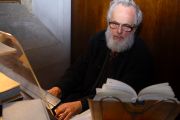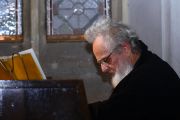
On the nature of the queen of sciences or Mathematics – Petr Hájek has died
On the nature of the queen of sciences or Mathematics – Petr Hájek has died
Mon Jan 02 14:38:00 CET 2017

“Mathematics is especially beautiful. Absolutely perfect in the sense that its results are entirely precisely formulated and completely exactly proved. Mathematics speaks of things that are very abstract and exist in some strange way. […] It could be the queen of the sciences because it is so classy,” prof. Petr Hájek confessed his love of his fatal field in an interview with Sylva Daníčková On the nature of the queen of sciences or Mathematics (2004). The important Czech mathematician and former director of the Institute of Informatics of the CAS, who was one of the world figures of mathematical logic and its use in artificial intelligence, died Sunday night after a short illness.
In 2006 President Václav Klaus awarded him a medal For Merit. Prof. P. Hájek is the author or co-author of several books and around 300 specialized studies, which he published mainly in foreign journals, and prepared four textbooks. From 1996, he was i.a. a member of the Learned Society of the CR, in 1996–2003 he served as the president of the Kurt Gödel Society. We remember the exceptional personality of Prof. P Hájek in an interview by Sylva Daníčková and František Houdek, which is also part of the publication The Hidden Message of Science (2009).
On the nature of the queen of sciences or Mathematics
I would never dare to enter the waters of mathematics alone, but with my knowledgeable colleague at my side we quite successfully opened a bit in meeting with the mathematician Petr Hájek – in my opinion for whom mathematics fills me with awe – that inaccessible area for many, which entails a strange beauty next to the numbers of the hidden secret. RNDr. Petr Hájek, DrSc., was director of the Institute of Informatics of the CAS in 1992–2000, where he is a research employee today. He is also a professor at CU, organist at the Czech Brethren-Evangelical church in Prague U Klimenta (St Clement’s), member of the Learned Society of the CR and laureate of the Bolzano Medal of the CAS.
Doctor, why is mathematics the queen of sciences?
Mathematics is especially beautiful. Absolutely perfect in the sense that its results are entirely precisely formulated and completely exactly proved. Mathematics speaks of things that are very abstract and exist in some strange way. Say natural numbers: I believe that the set of natural numbers as a whole is a beautiful example of an object that exists mathematically but not physically in nature. It means that mathematics can be applied to the natural sciences, but itself is a kind of temple of the spirit, where things are precisely given and precisely defined; It gives us an understanding of the infinite as an accurately described concept. It could be the queen of the sciences because it is so classy.
Do you have the feeling of some exceptionality that you are gifted precisely for communication with the queen of the sciences? Is an obligation for you, a gift, a privilege?
I chose mathematics as an alternative quite late, only in the last year of secondary school, namely because I did not want to memorize anything, I rather wanted to derive things. I was quite naïve in the idea of what mathematics actually is. And when I really began to learn what mathematics is I took it as an enormous gift and I am grateful that I can be a mathematician, because it suits me immensely.
The story of the hunters and the raven is well-known, which shows that animals can “count” to a certain number. The legendary physicist Faraday was not very good at mathematics and did not use it, although he thought mathematically according to the great mathematician Maxwell. And third – the theoretical physicist Gamow provides a quotation of his teacher: “The work of mathematicians does not lie in performing the correct mathematical operations, that is the work of bank accountants.” Then what are calculations in the sense of accounting and what is mathematics?
Above all, the work of a mathematician does not lie in the performance of any prescribed actions, but in exploring the unknown. Aided by deduction from axioms in the discovery. And here inspiration, idea, a sort of talent plays a role. So, creators’ mathematics begins where a mathematician lays a precisely defined problem and then tries to solve it using the methods of exact proofs.
So, it means that the mathematics is a certain space outside of the reality in which we live, a space in its way closed, where has its rules and where certain things take place special only to this place? Is it related to the discovery that there is something that elsewhere cannot be seen, what does not exist elsewhere? And this space is in what relationship with the rest of the world?
What you say, smacks a little of philosophy of mathematics, in which I am not an expert, but for me personally it is as you say. That means, yes, mathematics speaks about a world that exists in a very specific way beyond time and space, and that space and time can be applied if we find that some material things and relationships behave in a way that corresponds to the mathematical relationships and the it is possible to speal about them in the language of mathematics. Counting people in the room, and then all sorts of addition and subtraction, that is the application of mathematics, not mathematics as such.
So, mathematics is, as you say, the language for a specific reality. At a lecture, I heard that mathematics is the language of physics…
Certainly yes, mainly theoretical physics. If I understand it, that asks mathematical questions inspired by a physical problem, they solve them mathematically and then determine whether that solution correponds to experimental results.
I will present two quotations: Mathematics has no royal (read: privileged, easier) road, Euclides was to have said. And next: Mathematics should not be considered to be complete until you have made it so clear that you can explain it to the first man whom you meet on the street, said the phenomenal German mathematician David Hilbert. Considering what was said above, does it make sense to popularize, i.e. simplify, mathematics? It isn’t it the work of Sisyphus and degrading the discipline?
Certainly the work of Sisyphus, but not degrading. In my opinion, popularization of mathematics is virtuous and praiseworthy because the general public can get an idea of what mathematicians are doing at all. But it is understandably very difficult. Mathematics is increasingly advanced and connecting the ends of the widening scissors between advanced mathematics and newspaper readers is becoming increasingly difficult. Few can manage that. Perhaps because the popularization of mathematics often turns to the popularization of mathematicians, which is not the same thing.
The practical importance of mathematics is increasing, at the same time as the fear of it is rising. Why? Will ever fewer mathematicians in their towers of numbers, sets and infinities do ever more mathematics for the rest?
I do not know how to answer that… But the role of mathematics in this sense is radically shifted by the fact of the existence of ever more powerful computers. Some methods of the early 20th century for mechanical, manual calculation of some integrals are already long forgotten today because the computer does it in a flash.
There are many statements on this topic, for all of them the one by Wiener: “Mathematics is a sport mainly for the young.” How does top mathematics relate to the age of mathematicians? Why do they often die young?
That would require some sociological data. It is ture that some mathematicians gave their best performances when very young, from my field Kurt Gödel, Brno native, who provided his main share in 1930–31, when he was 24–25… He proved that – stated briefly – mathematics will never be complete, because mathematicians before that believed: everything will be resolved in a few years and mathematics will be closed. And precisely Gödel against all their expectations proved that it is not possible.
Although one of the first if not the very first female university professors was the mathematician, the Russian Sofia Kovalevskaya in Stockholm in 1884, there are distinctly few women in top mathematics. Why?
It's definitely not a congenital ailment as they say. In our institute, in the area where I work, we have four departments. Two of them are headed by women, and rightly so.
It has been said that like a musician recognizes already in the first bars Mozart, Beethoven, so a mathematician recognizes after a few pages Cauchy, Gauss… The greatest elegance supposedly characterizes the Frenchman, most dramatic vigor the Englishman. What would you say about the mathematical beauty? Do you also have a beauty queen among equations, theories?
I once lectured at a seminar “Mathematics and Music” on a quite sinister topic The application of music in mathematics. On the contrary, much can be said on the application of mathematics in music, but the other way around? I tried to start from the rhetoric of Bach’s music described and analysed by Bach’s contemporary Matheson and I projected it into a mathematical lecture as the speech of a received message. That worked beautifully! A mathematician can cause an aesthetic experience in that whne you follow a consideration, everything seems clear and all at once an entirely new idea enters that, which gives it a completely new dimension, like when a new voice is added to a performed polyphony. It is possible to speak of an aesthetic perception of a mathematical proof heard or even read.
Do you agree that “Music is a hidden arithmetic exercise of the soul, which does not know that it is counting", as Leibniz said?
Bach's music is characterized by great internal discipline and logic, there it would therefore be possible to say in quotation marks that Bach counts. In contrast, romantic music is more fantastic and looser…
What do mathematics and music have in common in your inner world? Would you try to characterize the music by mathematics and vice versa?
What they have in common is some abstract nature. I think it was Foerster who said that the composer is the most like the heavenly creator, since he creates from nothing. Music is truly an abstract matter, not seen, and in that it is similar to mathematics. It is again different in that it is about a precise deduction in mathematics, where it is rather about emotions and affects in music. They definitely have in common a kind of different way of existence. It is hard to speak of it – in what mathematics and music are beautiful for me, they seem very similar…
Nevertheless, as a mathematical proof can provide a certain aesthetic experience, so it is possible on the contrary to analyse a musical work as a kind of precise structure, which has certain regularities that can be described mathematically.
Newton declared that Mathematics is the dividing line and border between man and God. Do you agree with that?
I am a Christian. And mathematics did not bring me to that, I was a Christian long before I was a mathematician. In my opinion, however, mathematics can serve as a metaphor for certain considerations of religious faith and certain considerations on the existence of God. Gödel as an entirely secondary issue in his production left a formal proof of the existence of a Godlike being. I have lectured on it several times and I emphasized that religious faith does not rely on formal proofs, but on a certain calling to imitation.
For me, that “God” is always somewhat mysterious, more associated with love. In a book of interviews, Cardinal Ratzinger said, to my amazement, that the world is mathematical. Isn’t it related with order? The created world has order. Isn’t precisely order the link between mathematics and the Creator God?
I agree with that. You mentioned love… There may be one more thing here, which can be a metaphor of mathematics to religious faith, because mathematics accepts some things as primitive in the sense of initial. They are not defined, but simply are here. For me, the word God is not something I would try to define in any way; for me, God is a primitive concept, a basic idea, from which everything else flows. God is not in the world, but the world is in God.
The world of religious faith is radically different from the scientific world, it is not about proving things in faith, but in imitation, a life position. I note again that in my opinion mathematics can offer certain metaphors for judgement in religious faith, but science can definitelybe done both with faith and without faith.
Mathematicians are indeed people subject to the same passions as other people, however, they are gifted. What is the reverse of such a gift?
This again affects not only mathematicians. A mathematician, accustomed to thinking strictly logically and taking his considerations to the end, may suffer more from the illogicality and inconsistency of everyday life, but just as a painter has to suffer through colour or a musician through the ubiquitous cacophony of noises.
So, you are “struck” already twice in this.
I guess so, but I accept that price.
Prepared by: Department of Academic Media
Photo: Stanislava Kyselová






